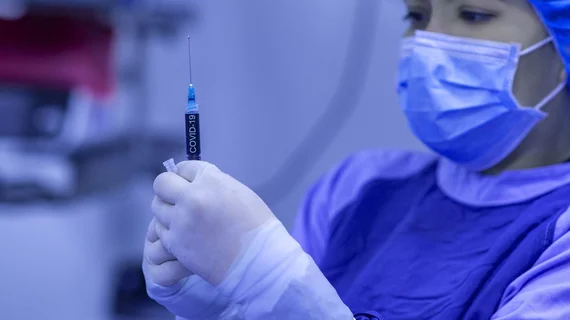Radiologists, CDC warn of myocarditis in young adults after COVID-19 vaccination
Radiologists and the U.S. Centers for Disease Control and Prevention are warning about rare instances of myocarditis after receiving the Moderna or Pfizer COVID-19 vaccines.
The CDC alerted healthcare professionals about the issue late last week. There have reportedly been several dozen cases of such inflammation of the heart muscle, typically within four days following the second dose. Those affected are primarily male young adults and adolescents, the agency noted.
In one recent example, Massachusetts imaging experts highlighted a 24-year-old man who presented with acute substernal chest pain four days after his second Moderna shot. Cardiac MRI with gadolinium enhancement helped confirm the diagnosis, they detailed May 18 in Radiology Case Reports.
“The data in hand suggest a small risk of myocarditis following infection, as well as thrombosis-related myocardial infarction,” Elisabeth Albert, MD, a cardiothoracic imaging fellow with UMass Memorial Medical Center’s Department of Radiology, and co-authors concluded. “Despite our report, it appears that there is a significantly higher risk of cardiac involvement from COVID-19 infection compared to COVID-19 vaccination. Accordingly, we believe that COVID-19 vaccination should remain the cornerstone for population immunity,” they added.
The American Heart Association echoed those sentiments in its own May 23 alert, emphasizing that the benefits of vaccination “enormously outweigh” the rare risk of myocarditis. This inflammation of the middle layer of the wall of the organ can weaken the heart’s muscle and electrical system. Severe myocarditis may lead to heart failure, abnormal heartbeat or sudden death, the association noted.
Albert and colleagues’ 24-year-old patient appeared healthy and had no history of heart problems. He initially experienced fevers, chills and body aches in the 24 hours following his second shot. Symptoms progressed into substernal chest pain, which worsened during deep breathing or while lying on his back. MRI demonstrated edema and delayed gadolinium enhancement of the left ventricle in a mid-myocardial and epicardial distribution, the authors noted. Providers discharged the individual with a beta-blocker medication, and he was instructed to avoid NSAIDs and strenuous activities for three months.
You can read more about the incident—including specific indications for cardiac MRI in suspected myocarditis—here.
Related COVID-19 Content:
Myocarditis, arrhythmias and more: An ACC update on what cardiologists know about long COVID-19
Athletes with COVID-19 may require heart MRI screening for myocarditis, new data suggest
4 cardiac arrhythmias associated with COVID-19
What we know about COVID-19 and cardiogenic shock
Mild COVID-19 infections not associated with long-term risk of heart damage
The pandemic’s toll: 55 long-term side effects of COVID-19
4 key takeaways from an updated look at vaccine-related myocarditis in the U.S.
Most young people with vaccine-related myocarditis recover quickly
Intrathoracic complications in COVID patients: Incidence, associations and outcomes
Congenital heart disease increases risk of poor COVID-19 outcomes, including death
MRI scans show COVID's 'significant' impact on the brain
Heart complication seen for the first time in a young patient after COVID-19 vaccination
American Heart Association investing $10 million to study the long-term consequences of COVID-19
Cardiologist discusses COVID-19, myocarditis among professional athletes and more
Not so fast: Specialists warn against cardiac imaging for asymptomatic COVID-19 patients
Study shows COVID-19 can infect heart cells—and do serious damage in the process

